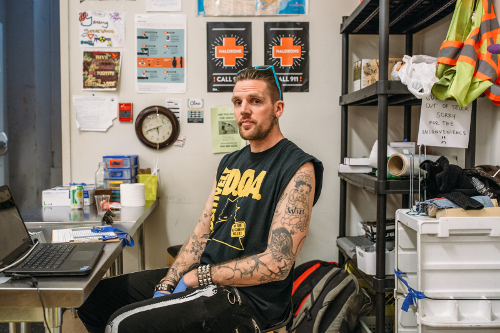The story of Vancouver’s first safe injection site
As the opioid drug crisis takes lives across North America, cities are looking for new ways to stop people from dying. Seattle is now considering creating a safe consumption site, but the first city in Cascadia to introduce a safe-injection facility was Vancouver, in 2003.
Vancouver journalist Travis Lupick, who’s been covering the overdose epidemic for many years, has a new a new book Fighting for Space, that tells the story of how activists battled to create a safe space for heroin users in the Downtown Eastside. Cascadia Magazine has an excerpt online from that book, the story of the very first site, something activists protecting the secrecy of the project dubbed “The Hair Salon.”
“Hundreds of intravenous drug users were concentrated on the 100 block, so it wasn’t like opening an official injection site there would attract many more. They were all already there, so why not give them a place where they could use inside instead of leaving them in the alleys?”
Click here to read Travis’s story.
In addition, Cascadia Magazine’s coverage of safe consumption includes Kelsey Hamlin’s extensive feature on Seattle’s slow process toward creating safe consumption spaces, as well as Jackie Dives’ phenomenal photographs from the Overdose Prevention Society site in Vancouver. It’s an activist-created space that hires peer workers–many of whom are drug users themselves. The facility intervened in more than 200 overdoses last year without a fatality.
If you appreciate high-quality journalism and photography like this, please take a moment to visit our donate page. We’re in the midst of a June fundraising drive with the goal of reaching $15,000. We’re a reader-supported publication and we depend on the support of readers like you to keep doing the work we do.
And if you’re already a supporting reader, thank you!
Cascadia Magazine original: when home is a parking spot
More than 2,000 homeless people sleep in their vehicles across Seattle each night. Reporting for Cascadia Magazine, Will Sweger takes an inside look at the life of campers like Scott Owens– a construction worker originally from Denver who can’t afford an apartment and lives in his van in the city’s Sodo industrial district. It’s a difficult and dangerous life, where finding a bathroom or shower is difficult, crime always a risk, and where eviction by police a looming possibility.
The feature includes fantastic photography by Seattle-based photographer, editor, and writer Nia Martin.
New study finds Vancouver police are racially profiling
Mychaylo Prystupa, writing for CTV, reports on new data that show Vancouver police over the past 10 years check ID of Indigenous people and blacks at substantially higher rates than whites. Mayor Gregor Robertson has called for an investigation into VPD’s racial profiling. Meanwhile OPB reports on a new study of racial inequality in Washington county (suburban Portland) that finds major disparities in homeownership, education, and interactions with law enforcement.
Why Salem’s water is contaminated by algae
OPB reports on the ongoing problem of drinking water contamination in Salem, Oregon. Blooms of cyanobacteria in Detroit Lake, the city’s water source, continue–and there’s not much anyone can do about it.
Permits and challenges could delay Trans Mountain pipeline
The Star Vancouver notes that an array of permit applications, protests, and legal challenges from First Nations and other groups could delay expansion of the controversial Trans Mountain pipeline across British Columbia for years. BCTV reports on how Washington’s Tulalip tribe is supporting protests by First Nations against the pipeline.
How Seattle scientist Sarah Myhre became a political advocate
Eve Andrews, in a fantastic article for Grist, profiles Seattle-based climate scientist Sarah Myhre and describes how she became an outspoke activist for action on climate change and feminism in the sciences. “Under the current administration, it’s becoming clear to young scientists and early-career scientists that science has never been apolitical.” Cascadia Magazine recently published’s Myhre’s essay on fighting sexism in the sciences and politics: “Why Science, Why Women, Why Now?“
Bumblebees are in decline in Cascadia
The Washington Post reports on how scientists are studying declines in native bumblebee species in the Pacific Northwest, and how the loss of these pollinators is affecting whole ecosystems. Cascadia Magazine featured an interview with biologist Mark L. Winton and poet Renée Sarojini Saklikar who’ve collaborated on a book about the decline: Listening to the Bees.
Book review: Dear Current Occupant by Chelene Knight
At BC BookLook, Jennifer Chutter reviews Vancouver author Chelene Knight’s innovative memoir Dear Current Occupant. Mixing poetry, vignettes, and non-fiction, the book captures the difficulties of growing up poor in Vancouver’s Downtown Eastside, facing racism, as well as the plentiful small joys of childhood. That’s today arts, culture and news from the sunny world headquarters of Cascadia Daily and Cascadia Magazine. –Andrew Engelson Photo credits: scenes from the Overdose Prevention Society site in Vancouver by Jackie Dives, homeless man in front of his van by Nia Martin, Vancouver police motorcycle by Jay Siggers via Wikimedia Commons, CC BY-SA 2.0, Sarah Myhre at the Seattle March for Our LIves, courtesy Sarah Myhre, cover of Dear Current Occupant courtesy of Book*Hug.

